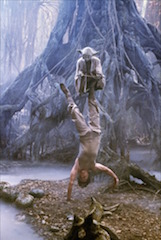This is a continuation of an essay analysis of the Force from Star Wars and The Empire Strikes Back. If you have not, read A Theology of the Force – Part 1 and Part 2 before continuing with this article.
Also, a quick note on sources for Part 2. I am indebted to the work of John C. McDowell in his book, The Gospel According to Star Wars; James Harleman’s Star Wars series at Cinemagogue; and a cool breakdown of some biblical lessons from Yoda from Tony Feagin’s blog. All three sources were extremely helpful to stir the pot as I watched and re-watched ESB.
[divider top=”no”]
Power, the specter and attainment of it, is the real “force” of the first two movies. Before Yoda elucidates the nuances of the Force to Luke on Dagobah, the concept of an all powerful “Force” is only once referred to in a moralistic sense. Obi-Wan says of Vader’s turn to evil, “[Vader] was seduced by the dark side of the Force,” when speaking to Luke about the Empire and the dark times after the Clone Wars. Even then it is not clear what that means. While it is much truer of Star Wars than The Empire Strikes Back, the Force is a motif for the struggle for and attainment of power.
While Luke wrestles with a rudimentary knowledge of the Force, Vader is the real key to seeing the Force as a metaphor for power. From what we know of his betrayal and rise, Vader used the darker sides of the Force to eliminate his enemies and solidify the Empire’s grasp on the galaxy. While the Jedi Knights used the Force to keep peace and justice in the galaxy, Vader used it seize control for himself and the Emperor; a shadowy, non-existent figure in the first two films, minus a couple minutes as a hologram.
In the Death Star meeting room, Vader rebukes Admiral Motti that the Empire’s most powerful weapon is not the planet crushing Death Star, but the Force. Besides being a premonition of the super weapons’ untimely demise, it is further insight into Vader’s motivations behind his turn from good to evil. While we don’t find out exactly what motivated him, specifically, until 2005’s Episode III, we do know that Vader’s grab for power and control is directly linked to his involvement with the Empire and the dark side of the Force.
The mysterious “Dark side” Obi-Wan spoke of in Star Wars is not expounded with any profundity or concrete conviction until Luke visits Yoda on the swamp planet of Dagobah in the second act of Episode V. After the initial shenanigans Yoda inflicts on poor, unsuspecting Luke, they begin training in the ways of a Jedi and Yoda reveals the moral compass of the Force to young Skywalker.
“[A] Jedi’s strength flows from the Force. But beware of the dark side. Anger, fear, aggression; the dark side of the Force are they. Easily they flow, quick to join you in a fight. If once you start down the dark path, forever will it dominate your destiny, consume you it will, as it did Obi-Wan’s apprentice.”
Anger, fear, aggression; all of these emotions and deep-seated feelings flow into starting down the path and ultimately embracing the dark side of the Force. It conjures up images of the Holocaust, perpetrated by fear mongering and propaganda, or the genocides in Rwanda that resulted from a misguided fear of another ethnic group. Or it reminds us of our gut reactions to feeling threatened, to being a caged animal, forced into an aggressive response that reasserts our place as being the one in power. Spousal abuse, rape, torture, murder, slander, oppression; all of these things are fruits of anger, fear, and aggression and warrant a stern warning from Jedi Master Yoda. It brings to mind Jesus’ admonition from John 3 that people loved the darkness because their deeds were evil.
Vader, Obi-Wan’s apprentice, chose the easy path to power and embraced the dark side. As a later incident illustrates to a training Luke when he heads into the Dark Side cave, the power of the Force is what you take with you. It is painfully revealed to Luke that taking a lightsaber to battle results in a battle. Consequently, if you bring emotions like anger, fear, hatred, and aggression with you, you will get those things in return. It’s a dramatic telling of Jesus’ prescription to “treat others as you want to be treated.” If you bring fear and anger, it will be given back to you and come to define you.
In contrast, the good side of the Force, called “the Light Side”, is much vaguer in The Empire Strikes Back, but is essentially billed as the contrarian position to the Dark Side. We’re never told that the Light Side is the exact opposite of fear, anger, and aggression. However, Yoda and Obi-Wan both say that the Jedi, practitioners of the Light Side, are dedicated to knowledge, peace, justice, and defense.
Luke: But how am I to know the good side from the bad?
Yoda: You will know… when you are calm, at peace, passive. A Jedi uses the Force for knowledge and defense, NEVER for attack.
It is not a total match, but it shares similarities to the Old Testament command to, “Be still and know that I am God.”
The way of the Jedi was one that held knowledge to be the combatant of fear, peace to be the combatant of anger, and justice and defense to be the combatant of aggression which perpetrates injustice. The light side of the Force also deals in power, but it is a force for good.
The wrench in Luke’s training comes when he has a vision of Leia and Han suffering in a “city among the clouds.” Yoda and Ben are right to warn Luke of the dangers of rash action and fearful response, stressing the need for him to detach himself from those relationships. It is that fear, the anger that comes against the perpetrator of the fear, and the aggressions that follows that Yoda and Ben are cautious of and what Vader is hoping in.
Darth Vader lures Luke into a trap to turn him to the Dark Side. But not at first. His main goal was to capture this threat and bring him to the Emperor. He appeals to Luke’s base need to survive, only diverting course when the young Skywalker proves more resourceful and powerful than initially thought. Only then does Vader turn the screws and preaches the merits of the dark side of the Force. Vader has first-hand experience of how powerful one can become under the sway of the dark side, and he assumes that is enticing enough.
But, when it fails, he finally drops the real bomb and reveals Luke’s origins and Vader’s true identity. When he utters those famous lines, he begins down a new path to entice his son.
“You can destroy the Emperor. He has foreseen it. It is your destiny. Join me and together we can rule the galaxy as father and son. Come with me, it is the ONLY way.”
It is the moment of truth. Luke seems to have no other choice. He can either join or die. Does he try to fight his way out or does he reluctantly go with the black armored man calling himself his father. Either way, he is doomed to embrace a part of the dark side, whether he attacks Vader, successfully kills him, or joins him.
However, in this moment, Luke becomes a Jedi, in my opinion. Instead of embracing the dark path, he goes the way of Obi-Wan and chooses death. He hurls himself into the pit of Cloud City and I think he fully believed he would die. What he didn’t know is how Christ-like his decision was and how biblical a precedence he was setting. Luke’s intended sacrifice was a laying down of his ability to embrace power and fully humbling himself to the point of death.
“Greater love has no one than this: to lay down one’s life for one’s friends.” -John 15:13
Star Wars is surprisingly biblical in its embrace of a sacrificial love and service for others. What is seen as being righteous and “of the light” is a complete abdication of power and the right to wield it. The most just and loving thing one can do is to serve others and give up any power one has over another. That is true power, echoing the power of the cross; a power for good, justice, and peace.
[divider top=”no”]
Next time, we turn our attention to The Return of the Jedi, which sets up the final confrontation between the dark side and the light. It is not necessarily a return of the Jedi, but Luke paving a new path for the Jedi that has his father’s heart but the wisdom and morality of the Jedi.



Beautifully written and wonderful ideas. Awesome, Josh!